
The Project Gutenberg EBook of The Dore Gallery of Bible Illustrations,
Volume 7, by Anonymous, Illustrated by Gustave Dore
This eBook is for the use of anyone anywhere at no cost and with
almost no restrictions whatsoever. You may copy it, give it away or
re-use it under the terms of the Project Gutenberg License included
with this eBook or online at www.gutenberg.org
Title: The Dore Gallery of Bible Illustrations, Volume 7
Illustrated by Gustave Dore
Author: Anonymous
Release Date: July 28, 2004 [EBook #8707]
Language: English
Character set encoding: ISO-8859-1
*** START OF THIS PROJECT GUTENBERG EBOOK DORE BIBLE GALLERY, VOL. 7 ***
Produced by David Widger


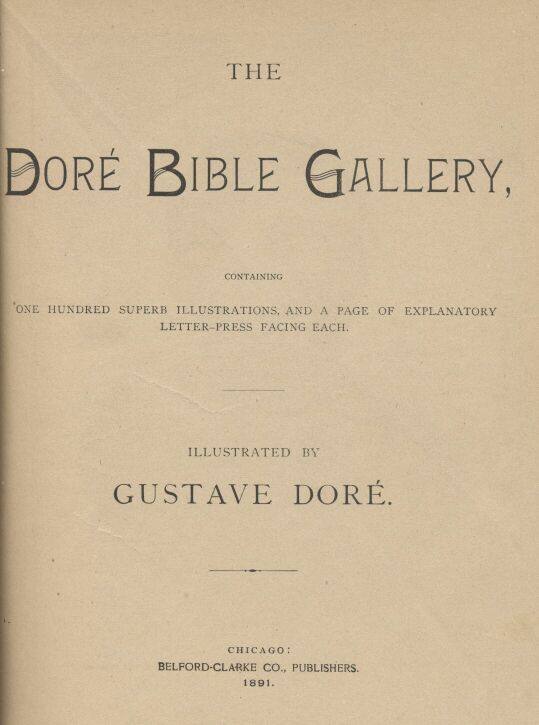
This volume, as its title indicates, is a collection of engravings illustrative of the Bible—the designs being all from the pencil of the greatest of modern delineators, Gustave Dore. The original work, from which this collection has been made, met with an immediate and warm recognition and acceptance among those whose means admitted of its purchase, and its popularity has in no wise diminished since its first publication, but has even extended to those who could only enjoy it casually, or in fragmentary parts. That work, however, in its entirety, was far too costly for the larger and ever-widening circle of M. Dore's admirers, and to meet the felt and often-expressed want of this class, and to provide a volume of choice and valuable designs upon sacred subjects for art-loving Biblical students generally, this work was projected and has been carried forward. The aim has been to introduce subjects of general interest—that is, those relating to the most prominent events and personages of Scripture—those most familiar to all readers; the plates being chosen with special reference to the known taste of the American people. To each cut is prefixed a page of letter-press—in, narrative form, and containing generally a brief analysis of the design. Aside from the labors of the editor and publishers, the work, while in progress, was under the pains-taking and careful scrutiny of artists and scholars not directly interested in the undertaking, but still having a generous solicitude for its success. It is hoped, therefore, that its general plan and execution will render it acceptable both to the appreciative and friendly patrons of the great artist, and to those who would wish to possess such a work solely as a choice collection of illustrations upon sacred themes.
The subject of this sketch is, perhaps, the most original and variously gifted designer the world has ever known. At an age when most men have scarcely passed their novitiate in art, and are still under the direction and discipline of their masters and the schools, he had won a brilliant reputation, and readers and scholars everywhere were gazing on his work with ever-increasing wonder and delight at his fine fancy and multifarious gifts. He has raised illustrative art to a dignity and importance before unknown, and has developed capacities for the pencil before unsuspected. He has laid all subjects tribute to his genius, explored and embellished fields hitherto lying waste, and opened new and shining paths and vistas where none before had trod. To the works of the great he has added the lustre of his genius, bringing their beauties into clearer view and warming them to a fuller life.
His delineations of character, in the different phases of life, from the horrible to the grotesque, the grand to the comic, attest the versatility of his powers; and, whatever faults may be found by critics, the public will heartily render their quota of admiration to his magic touch, his rich and facile rendering of almost every thought that stirs, or lies yet dormant, in the human heart. It is useless to attempt a sketch of his various beauties; those who would know them best must seek them in the treasure—house that his genius is constantly augmenting with fresh gems and wealth. To one, however, of his most prominent traits we will refer—his wonderful rendering of the powers of Nature.
His early wanderings in the wild and romantic passes of the Vosges doubtless developed this inherent tendency of his mind. There he wandered, and there, mayhap, imbibed that deep delight of wood and valley, mountain—pass and rich ravine, whose variety of form and detail seems endless to the enchanted eye. He has caught the very spell of the wilderness; she has laid her hand upon him, and he has gone forth with her blessing. So bold and truthful and minute are his countless representations of forest scenery; so delicate the tracery of branch and stem; so patriarchal the giant boles of his woodland monarchs, that the' gazer is at once satisfied and entranced. His vistas lie slumbering with repose either in shadowy glade or fell ravine, either with glint of lake or the glad, long course of some rejoicing stream, and above all, supreme in a beauty all its own, he spreads a canopy of peerless sky, or a wilderness, perhaps, of angry storm, or peaceful stretches of soft, fleecy cloud, or heavens serene and fair—another kingdom to his teeming art, after the earth has rendered all her gifts.
Paul Gustave Dore was born in the city of Strasburg, January 10, 1833. Of his boyhood we have no very particular account. At eleven years of age, however, he essayed his first artistic creation—a set' of lithographs, published in his native city. The following year found him in Paris, entered as a 7. student at the Charlemagne Lyceum. His first actual work began in 1848, when his fine series of sketches, the "Labors of Hercules," was given to the public through the medium of an illustrated, journal with which he was for a long time connected as designer. In 1856 were published the illustrations for Balzac's "Contes Drolatiques" and those for "The Wandering Jew "—the first humorous and grotesque in the highest degree—indeed, showing a perfect abandonment to fancy; the other weird and supernatural, with fierce battles, shipwrecks, turbulent mobs, and nature in her most forbidding and terrible aspects. Every incident or suggestion that could possibly make the story more effective, or add to the horror of the scenes was seized upon and portrayed with wonderful power. These at once gave the young designer a great reputation, which was still more enhanced by his subsequent works.
With all his love for nature and his power of interpreting her in her varying moods, Dore was a dreamer, and many of his finest achievements were in the realm of the imagination. But he was at home in the actual world also, as witness his designs for "Atala," "London—a Pilgrimage," and many of the scenes in "Don Quixote."
When account is taken of the variety of his designs, and the fact considered that in almost every task he attempted none had ventured before him, the amount of work he accomplished is fairly incredible. To enumerate the immense tasks he undertook—some single volumes alone containing hundreds of illustrations—will give some faint idea of his industry. Besides those already mentioned are Montaigne, Dante, the Bible, Milton, Rabelais, Tennyson's "Idyls of the King," "The Ancient Mariner, Shakespeare, "Legende de Croquemitaine," La Fontaine's "Fables," and others still.
Take one of these works—the Dante, La Fontaine, or "Don Quixote"—and glance at the pictures. The mere hand labor involved in their production is surprising; but when the quality of the work is properly estimated, what he accomplished seems prodigious. No particular mention need be made of him as painter or sculptor, for his reputation rests solely upon his work as an illustrator.
Dore's nature was exuberant and buoyant, and he was youthful in appearance. He had a passion for music, possessed rare skill as a violinist, and it is assumed that, had he failed to succeed with his pencil, he could have won a brilliant reputation as a musician.
He was a bachelor, and lived a quiet, retired life with his mother—married, as he expressed it, to her and his art. His death occurred on January 23, 1883.
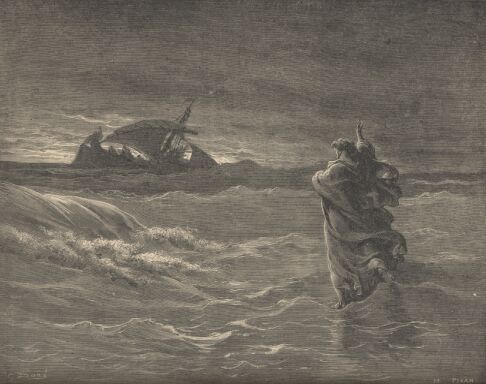
And when he had sent them away, he departed into a mountain to pray. And when, even was come, the ship was in the midst of the sea, and he alone on the land. And he saw them toiling in rowing; for the wind was contrary unto them: and about the fourths watch of the night he cometh unto them, walking upon the sea, and would have passed: by them. But when they saw him walking upon the sea, they supposed it had been a spirit, and cried out: for they all saw him, and were troubled. And immediately he talked with them, and saith unto them, Be of good cheer: it is I; be not afraid.
And he went up unto them into the ship; and the wind ceased: and they were sore amazed in themselves beyond measure, and wondered. For they considered not the miracle of the loaves; for their heart was hardened.—Mark vi, 46-52.
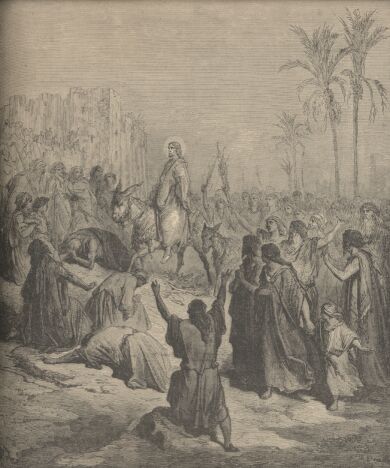
And when they drew nigh unto Jerusalem, and were come to Bethphage, unto the mount of Olives, then sent Jesus two disciples, saying unto them, Go into the village over against you, and straightway ye shall find an ass tied, and a colt with her: loose them, and bring the unto me. And if any man say ought unto you, ye shall say, The Lord hath need of them; and straightway he will send them.
All this was done that it might be fulfilled which was spoken by the prophet, saying, Tell ye the daughter of Sion, Behold, thy King cometh unto thee, meek, and sitting upon an ass'; and a colt the foal of an ass.
And the disciples went, and did as Jesus commanded them, and brought the ass, and the colt, and put on them their clothes, and they set him thereon.
And a very great multitude spread their garments in the way; others cut down branches; from the trees, and strewed them in the way. And the multitudes that went before, and that followed, cried, saying, Hosanna to the son of David: Blessed is he that cometh in the name of the Lord; Hosanna in the highest.
And when he was come into Jerusalem, all the city was moved, saying, Who is this? And the multitude said, This is Jesus the prophet of Nazareth of Galilee.—Matthew xxi, I-II.
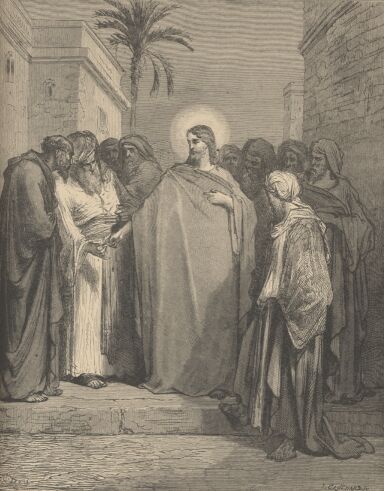
And they send unto him certain of the Pharisees and of the Herodians, to catch him in his words.
And when they were come, they say unto him, Master, we know that thou art true, and carest for no man: for thou regardest not the person of men, but teachest the way of God in truth: Is it lawful to give tribute to Caesar, or not? Shall we give, or shall we not give?
But he, knowing their hypocrisy, said unto them, Why tempt ye me? bring me a penny, that I may see it. And they brought it.
And he saith unto them, Whose is this image and superscription? And they said unto him, Caesar's.
And Jesus answering said unto them, Render to Caesar the things that are Caesar's, and to God the things that are God's.
And they marveled at him.—Mark xii, 13-17.
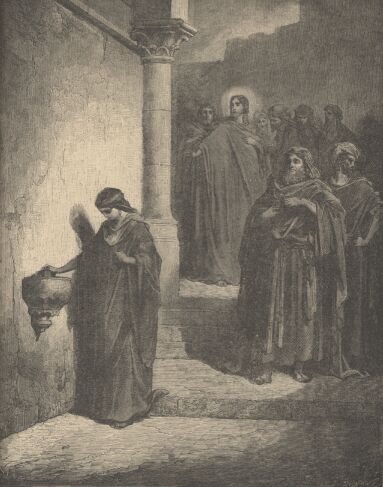
And Jesus sat over against the treasury, and beheld how the people cast money into the treasury: and many that were rich cast in much.
And there came a certain poor widow, and she threw in two mites, which make a farthing. And he called unto him his disciples, and saith unto them, Verily I say unto you, That this poor widow hath cast more in, than all they which have cast into the treasury: for all they did cast in of their abundance; but she of her want did cast in all that she had, even all her living.—Mark xii, 13-17
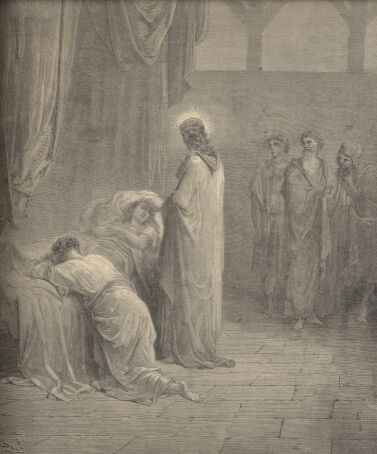
And, behold, there cometh one of the rulers of the synagogue, Jairus by name; and when he saw him, he fell at his feet, and besought him greatly, saying, My little daughter lieth at the point of death: I pray thee, come and lay thy hands on her, that she may be healed and she shall live. And Jesus went with him; and much people followed him, and thronged him.
And a certain woman which had an issue of blood twelve years, and had suffered many things of many physicians, and had spent all that she had, and was nothing bettered, but rather grew, worse, when she had heard of Jesus, came in the press behind, and touched his garment. For she said, If I may touch but his clothes, I shall be whole. And straightway the fountain of her blood was dried up; and she felt in her body that she was healed of that plague. And Jesus, immediately knowing in himself that virtue had gone out of him, turned him about in the press, and said, Who touched my clothes? And his disciples said unto him, Thou seest the multitude thronging thee, and sayest thou, Who touched me? And he looked round about to see her that had done this thing. But the woman fearing and trembling, knowing what was done in her, came and fell down before him, and told him all the truth. And he said unto her Daughter, thy faith hath made the whole; go in peace, and be whole of thy plague.
While he yet spake, there came from the ruler of the synagogue's house certain which said, Thy daughter is dead: why troublest thou the Master any further? As soon as Jesus heard the word that was spoken, he saith unto the ruler of the synagogue, Be not afraid, only believe. And he suffered no man to follow him, save Peter, and James, and John the brother of James. And he cometh to the house of the ruler of the synagogue, and seeth the tumult, and them that wept and wailed greatly. And when he was come in, he saith unto them, Why make ye this ado, and weep? the damsel is not dead, but sleepeth. And they laughed him to scorn. But when he had put them all out, he taketh the father and the mother of the damsel, and them that were with him, and entereth in where the damsel was lying. And he took the damsel by the hand, and said unto her, Talitha cumi; which is, being interpreted, Damsel, I say unto thee, arise. And straightway the damsel arose, and walked; for she was of the age of twelve years. And they were astonished with a great astonishment.
And he charged them straitly that no man should know it; and commanded that something should be given her to eat.—Mark v, 22-43.
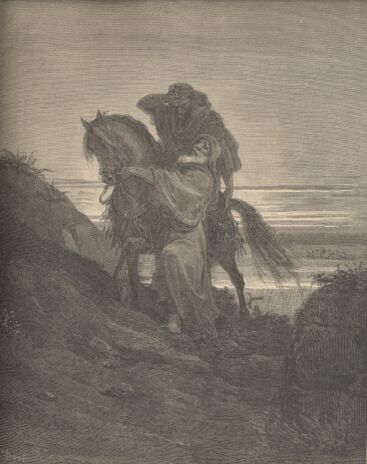
But he, willing to justify himself, said unto Jesus, And who is my neighbor?
And Jesus answering said, A certain man went down from Jerusalem to Jericho, and fell among thieves, which stripped him of his raiment, and wounded him, and departed, leaving him half dead. And by chance there came down a certain priest that way: and when he saw him, he passed by on the other side. And likewise a Levite, when he was at the place, came and looked on him, and passed by on the other side. But a certain Samaritan, as he journeyed, came where he was: and when he saw him, he had compassion on him. And went to him, and bound up his wounds, pouring in oil and wine, and set him on his own beast, and brought him to an inn, and took care of him. And on the morrow when he departed, he took out two pence, and gave them to the host, and said unto him, Take care of him; and whatsoever thou spendest more, when I come again, I will repay thee. Which now of these three, thinkest thou, was neighbor unto him that fell among the thieves?
And he said, He that shewed mercy on him.
Then said Jesus unto him, Go, and do thou likewise.—Luke x, 29-37.
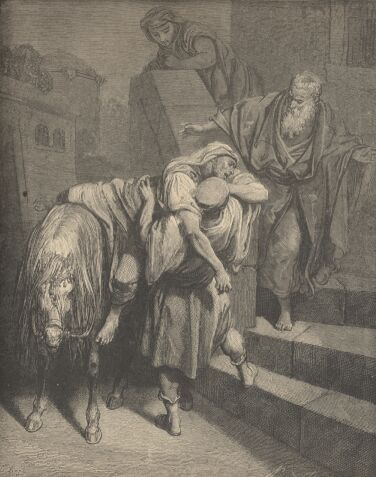
But a certain Samaritan, as he journeyed, came where he was; and when he saw him, he had compassion on him, and went to him, and bound up his wounds, pouring in oil and wine, and set him on his own beast, and brought him to an inn, and took care of him. Luke x, 33-34
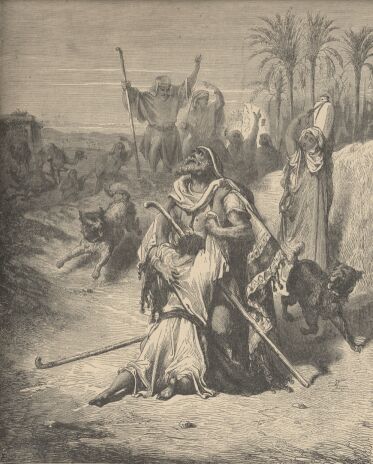
Likewise, I say unto you, there is joy in the presence of the angels of God over one sinner that repenteth.
And he said, a certain man had two sons: and the younger of them said to his father, Father, give me the portion of goods that falleth to me. And he divided unto them his living.
And not many days after the younger son gathered all together, and took his journey into a far country, and there wasted his substance with riotous living. And when he had spent all, there arose a mighty famine in that land; and he began to be in want. And he went and joined himself to a citizen of that country; and he sent him into his fields to feed swine. And he would fain have filled his belly with the husks that the swine did eat: and no man gave unto him.
And when he came to himself, he said, How many hired servants of my father's have bread enough and to spare, and I perish with hunger! I will arise and go to my father, and will say unto him, Father, I have sinned against heaven, and before thee, and am no more worthy to be called thy son: make me as one of thy hired servants.
And he arose, and came to his father. But when he was yet a great way off, his father saw him, and had compassion, and ran, and fell on his neck, and kissed him. And the son said unto him, Father, I have sinned against heaven, and in thy sight, and am no more worthy to be called thy son. But the father said to his servants, Bring forth the best robe, and put it on him; and put a ring on his hand, and shoes on his feet: And bring hither the fatted calf, and kill it; and let us eat, and be merry: for this my son was dead, and is alive again; he was lost, and is found. And they began to be merry.
Now his elder son was in the field: and as he came and drew nigh to the house, he heard music and dancing. And he called one of the servants, and asked what these things meant.
And he said unto him, thy brother is come; and thy father hath killed the fatted calf, because he hath received him safe and sound.
And he was angry, and would not go in: therefore came his father out, and intreated him. And he answering said to his father, Lo, these many years do I serve thee, neither transgressed I at any time thy commandment: and yet thou never gavest me a kid, that I might make merry with my friends: but as soon as this thy son was come, which hath devoured thy living with harlots, thou hast killed for him the fatted calf.
And he said unto him, Son, thou art ever with me, and all that I have is thine. It was meet that we should make merry, and be glad: for this thy brother was dead, and is alive again; and was lost, and is found.—Luke xv, 10-32
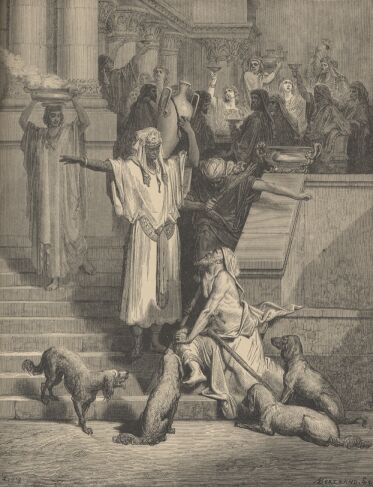
There was a certain rich man, which was clothed in purple and fine linen, and fared sumptuously every day:
And there was a certain beggar named Lazarus, which was laid at his gate, full of sores, and desiring to be fed with the crumbs which fell from the rich man's table: moreover the dogs came and licked his sores.
And it came to pass, that the beggar died, and was carried by the angels into Abraham's bosom: the rich man also died, and was buried; and in hell he lifted up his eyes, being in torments, and seeth Abraham afar off, and Lazarus in his bosom. And he cried and said, Father Abraham, have mercy on me, and send Lazarus, that he may dip the tip of his finger in water and cool my tongue; for I am tormented in this flame.
But Abraham said, Son, remember that thou in thy lifetime receivedst thy good things, and likewise Lazarus evil things: but now he is comforted, and thou art tormented. And beside all this, between us and you there is a great gulf fixed: so that they which would pass from hence to you cannot; neither can they pass to us, that would come from thence.
Then he said, I pray thee therefore, father, that thou wouldest send him to my father's house: for I have five brethren; that he may testify unto them, lest they also come into this place of torment.
Abraham saith unto him, They have Moses and the prophets; let them hear them.
And he said, Nay, father Abraham: but if one went unto them from the dead, they will repent.
And he said unto him, If they hear not Moses and the prophets, neither will they be persuaded though one rose from the dead.—Luke xvi, 19-31
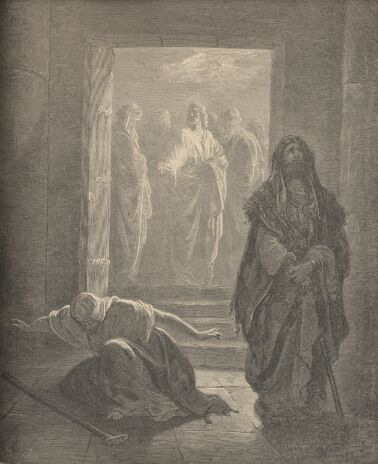
And he spake this parable unto certain which trusted in themselves that they were righteous, and despised others.
Two men went up into the temple to pray; the one a Pharisee, and the other a publican; The Pharisee stood and prayed thus with himself, God, I thank thee, that I am not as other men are, extortioners, unjust, adulterers, or even as this publican. I fast twice in the week, I give tithes of all that I possess. And the publican, standing afar off, would not lift up as much as his eyes unto heaven, but smote upon his breast, saying, God be merciful to me a sinner. I tell you, this man went down to his house justified rather than the other: for every: one that exalteth himself shall be abased; and he that humbleth himself shall be exalted. Luke xviii, 9-14.
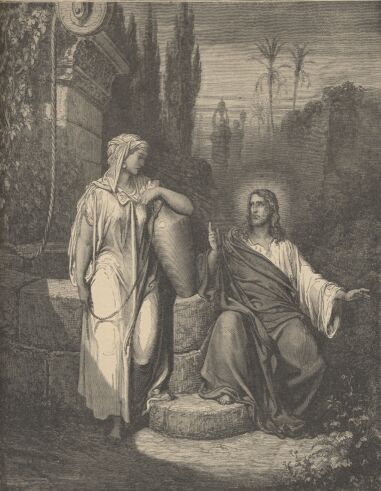
Then cometh he to a city of Samaria, which is called Sychar, near to the parcel of ground that Jacob gave to his son Joseph. Now Jacob's well was there. Jesus therefore, being wearied with his journey, sat thus on the well: and it was about the sixth hour. There cometh a woman of Samaria to draw water: Jesus saith unto her, Give me to drink.
(For his disciples were gone away unto the city to buy meat.)
Then saith the woman of Samaria unto him, How is it that thou, being a Jew, askest drink of me, which am a woman of Samaria? for the Jews have no dealings with the Samaritans.
Jesus answered and said unto her, If thou knewest the gift of God, and who it is that saith to thee, Give me to drink; thou wouldest have asked of him, and he would have given thee living water.
The woman saith unto him, Sir, thou hast nothing to draw with, and the well is deep from whence then hast thou that living water? Art thou greater than our father Jacob, which gave us the well, and drank thereof himself, and his children, and his cattle?
Jesus answered and said unto her, Whosoever drinketh of this water shall thirst again but whosoever drinketh of the water that I shall give him shall never thirst; but the water that I shall give him shall be in him a well of water springing up into everlasting life.
The woman saith unto him, Sir, give me this water, that I thirst not, neither come hither to draw.
Jesus saith unto her, Go, call thy husband, and come hither. The woman answered and said, I have no husband.
Jesus said unto her, Thou hast well said, I have no husband: for thou hast had five husbands; and he whom thou now hast is not thy husband: in that saidst thou truly.
The woman saith unto him, Sir, I perceive that thou art a prophet. Our fathers worshiped in this mountain; and ye say, that in Jerusalem is the place where men ought to worship.
Jesus saith unto her, Woman, believe me, the hour cometh, when ye shall neither in this mountain, nor yet at Jerusalem, worship the Father. Ye worship ye know not what: we know what we worship; for salvation is of the Jews. But the hour cometh, and now is, when the true worshipers shall worship the Father in spirit and in truth: for the Father seeketh such to worship him. God is a Spirit: and they that worship him must worship him in spirit and in truth.
The woman saith unto him, I know that Messias cometh, which is called Christ: when he is come, he will tell us all things.
Jesus saith unto her, I that speak unto thee am he.
And upon this came his disciples, and marveled that he talked with the woman: yet no man said, What seekest thou? or, Why talkest thou with her?
The woman then left her waterpot, and went her way into the city, and saith to the men, Come, see a man, which told me all things, that ever I did: is not this the Christ? Then they went out of the city, and came unto him.—John iv 5-30
End of the Project Gutenberg EBook of The Dore Gallery of Bible
Illustrations, Volume 7, by Anonymous, Illustrated by Gustave Dore
*** END OF THIS PROJECT GUTENBERG EBOOK DORE BIBLE GALLERY, VOL. 7 ***
***** This file should be named 8707-h.htm or 8707-h.zip *****
This and all associated files of various formats will be found in:
https://www.gutenberg.org/8/7/0/8707/
Produced by David Widger
Updated editions will replace the previous one--the old editions
will be renamed.
Creating the works from public domain print editions means that no
one owns a United States copyright in these works, so the Foundation
(and you!) can copy and distribute it in the United States without
permission and without paying copyright royalties. Special rules,
set forth in the General Terms of Use part of this license, apply to
copying and distributing Project Gutenberg-tm electronic works to
protect the PROJECT GUTENBERG-tm concept and trademark. Project
Gutenberg is a registered trademark, and may not be used if you
charge for the eBooks, unless you receive specific permission. If you
do not charge anything for copies of this eBook, complying with the
rules is very easy. You may use this eBook for nearly any purpose
such as creation of derivative works, reports, performances and
research. They may be modified and printed and given away--you may do
practically ANYTHING with public domain eBooks. Redistribution is
subject to the trademark license, especially commercial
redistribution.
*** START: FULL LICENSE ***
THE FULL PROJECT GUTENBERG LICENSE
PLEASE READ THIS BEFORE YOU DISTRIBUTE OR USE THIS WORK
To protect the Project Gutenberg-tm mission of promoting the free
distribution of electronic works, by using or distributing this work
(or any other work associated in any way with the phrase "Project
Gutenberg"), you agree to comply with all the terms of the Full Project
Gutenberg-tm License (available with this file or online at
https://gutenberg.org/license).
Section 1. General Terms of Use and Redistributing Project Gutenberg-tm
electronic works
1.A. By reading or using any part of this Project Gutenberg-tm
electronic work, you indicate that you have read, understand, agree to
and accept all the terms of this license and intellectual property
(trademark/copyright) agreement. If you do not agree to abide by all
the terms of this agreement, you must cease using and return or destroy
all copies of Project Gutenberg-tm electronic works in your possession.
If you paid a fee for obtaining a copy of or access to a Project
Gutenberg-tm electronic work and you do not agree to be bound by the
terms of this agreement, you may obtain a refund from the person or
entity to whom you paid the fee as set forth in paragraph 1.E.8.
1.B. "Project Gutenberg" is a registered trademark. It may only be
used on or associated in any way with an electronic work by people who
agree to be bound by the terms of this agreement. There are a few
things that you can do with most Project Gutenberg-tm electronic works
even without complying with the full terms of this agreement. See
paragraph 1.C below. There are a lot of things you can do with Project
Gutenberg-tm electronic works if you follow the terms of this agreement
and help preserve free future access to Project Gutenberg-tm electronic
works. See paragraph 1.E below.
1.C. The Project Gutenberg Literary Archive Foundation ("the Foundation"
or PGLAF), owns a compilation copyright in the collection of Project
Gutenberg-tm electronic works. Nearly all the individual works in the
collection are in the public domain in the United States. If an
individual work is in the public domain in the United States and you are
located in the United States, we do not claim a right to prevent you from
copying, distributing, performing, displaying or creating derivative
works based on the work as long as all references to Project Gutenberg
are removed. Of course, we hope that you will support the Project
Gutenberg-tm mission of promoting free access to electronic works by
freely sharing Project Gutenberg-tm works in compliance with the terms of
this agreement for keeping the Project Gutenberg-tm name associated with
the work. You can easily comply with the terms of this agreement by
keeping this work in the same format with its attached full Project
Gutenberg-tm License when you share it without charge with others.
1.D. The copyright laws of the place where you are located also govern
what you can do with this work. Copyright laws in most countries are in
a constant state of change. If you are outside the United States, check
the laws of your country in addition to the terms of this agreement
before downloading, copying, displaying, performing, distributing or
creating derivative works based on this work or any other Project
Gutenberg-tm work. The Foundation makes no representations concerning
the copyright status of any work in any country outside the United
States.
1.E. Unless you have removed all references to Project Gutenberg:
1.E.1. The following sentence, with active links to, or other immediate
access to, the full Project Gutenberg-tm License must appear prominently
whenever any copy of a Project Gutenberg-tm work (any work on which the
phrase "Project Gutenberg" appears, or with which the phrase "Project
Gutenberg" is associated) is accessed, displayed, performed, viewed,
copied or distributed:
This eBook is for the use of anyone anywhere at no cost and with
almost no restrictions whatsoever. You may copy it, give it away or
re-use it under the terms of the Project Gutenberg License included
with this eBook or online at www.gutenberg.org
1.E.2. If an individual Project Gutenberg-tm electronic work is derived
from the public domain (does not contain a notice indicating that it is
posted with permission of the copyright holder), the work can be copied
and distributed to anyone in the United States without paying any fees
or charges. If you are redistributing or providing access to a work
with the phrase "Project Gutenberg" associated with or appearing on the
work, you must comply either with the requirements of paragraphs 1.E.1
through 1.E.7 or obtain permission for the use of the work and the
Project Gutenberg-tm trademark as set forth in paragraphs 1.E.8 or
1.E.9.
1.E.3. If an individual Project Gutenberg-tm electronic work is posted
with the permission of the copyright holder, your use and distribution
must comply with both paragraphs 1.E.1 through 1.E.7 and any additional
terms imposed by the copyright holder. Additional terms will be linked
to the Project Gutenberg-tm License for all works posted with the
permission of the copyright holder found at the beginning of this work.
1.E.4. Do not unlink or detach or remove the full Project Gutenberg-tm
License terms from this work, or any files containing a part of this
work or any other work associated with Project Gutenberg-tm.
1.E.5. Do not copy, display, perform, distribute or redistribute this
electronic work, or any part of this electronic work, without
prominently displaying the sentence set forth in paragraph 1.E.1 with
active links or immediate access to the full terms of the Project
Gutenberg-tm License.
1.E.6. You may convert to and distribute this work in any binary,
compressed, marked up, nonproprietary or proprietary form, including any
word processing or hypertext form. However, if you provide access to or
distribute copies of a Project Gutenberg-tm work in a format other than
"Plain Vanilla ASCII" or other format used in the official version
posted on the official Project Gutenberg-tm web site (www.gutenberg.org),
you must, at no additional cost, fee or expense to the user, provide a
copy, a means of exporting a copy, or a means of obtaining a copy upon
request, of the work in its original "Plain Vanilla ASCII" or other
form. Any alternate format must include the full Project Gutenberg-tm
License as specified in paragraph 1.E.1.
1.E.7. Do not charge a fee for access to, viewing, displaying,
performing, copying or distributing any Project Gutenberg-tm works
unless you comply with paragraph 1.E.8 or 1.E.9.
1.E.8. You may charge a reasonable fee for copies of or providing
access to or distributing Project Gutenberg-tm electronic works provided
that
- You pay a royalty fee of 20% of the gross profits you derive from
the use of Project Gutenberg-tm works calculated using the method
you already use to calculate your applicable taxes. The fee is
owed to the owner of the Project Gutenberg-tm trademark, but he
has agreed to donate royalties under this paragraph to the
Project Gutenberg Literary Archive Foundation. Royalty payments
must be paid within 60 days following each date on which you
prepare (or are legally required to prepare) your periodic tax
returns. Royalty payments should be clearly marked as such and
sent to the Project Gutenberg Literary Archive Foundation at the
address specified in Section 4, "Information about donations to
the Project Gutenberg Literary Archive Foundation."
- You provide a full refund of any money paid by a user who notifies
you in writing (or by e-mail) within 30 days of receipt that s/he
does not agree to the terms of the full Project Gutenberg-tm
License. You must require such a user to return or
destroy all copies of the works possessed in a physical medium
and discontinue all use of and all access to other copies of
Project Gutenberg-tm works.
- You provide, in accordance with paragraph 1.F.3, a full refund of any
money paid for a work or a replacement copy, if a defect in the
electronic work is discovered and reported to you within 90 days
of receipt of the work.
- You comply with all other terms of this agreement for free
distribution of Project Gutenberg-tm works.
1.E.9. If you wish to charge a fee or distribute a Project Gutenberg-tm
electronic work or group of works on different terms than are set
forth in this agreement, you must obtain permission in writing from
both the Project Gutenberg Literary Archive Foundation and Michael
Hart, the owner of the Project Gutenberg-tm trademark. Contact the
Foundation as set forth in Section 3 below.
1.F.
1.F.1. Project Gutenberg volunteers and employees expend considerable
effort to identify, do copyright research on, transcribe and proofread
public domain works in creating the Project Gutenberg-tm
collection. Despite these efforts, Project Gutenberg-tm electronic
works, and the medium on which they may be stored, may contain
"Defects," such as, but not limited to, incomplete, inaccurate or
corrupt data, transcription errors, a copyright or other intellectual
property infringement, a defective or damaged disk or other medium, a
computer virus, or computer codes that damage or cannot be read by
your equipment.
1.F.2. LIMITED WARRANTY, DISCLAIMER OF DAMAGES - Except for the "Right
of Replacement or Refund" described in paragraph 1.F.3, the Project
Gutenberg Literary Archive Foundation, the owner of the Project
Gutenberg-tm trademark, and any other party distributing a Project
Gutenberg-tm electronic work under this agreement, disclaim all
liability to you for damages, costs and expenses, including legal
fees. YOU AGREE THAT YOU HAVE NO REMEDIES FOR NEGLIGENCE, STRICT
LIABILITY, BREACH OF WARRANTY OR BREACH OF CONTRACT EXCEPT THOSE
PROVIDED IN PARAGRAPH F3. YOU AGREE THAT THE FOUNDATION, THE
TRADEMARK OWNER, AND ANY DISTRIBUTOR UNDER THIS AGREEMENT WILL NOT BE
LIABLE TO YOU FOR ACTUAL, DIRECT, INDIRECT, CONSEQUENTIAL, PUNITIVE OR
INCIDENTAL DAMAGES EVEN IF YOU GIVE NOTICE OF THE POSSIBILITY OF SUCH
DAMAGE.
1.F.3. LIMITED RIGHT OF REPLACEMENT OR REFUND - If you discover a
defect in this electronic work within 90 days of receiving it, you can
receive a refund of the money (if any) you paid for it by sending a
written explanation to the person you received the work from. If you
received the work on a physical medium, you must return the medium with
your written explanation. The person or entity that provided you with
the defective work may elect to provide a replacement copy in lieu of a
refund. If you received the work electronically, the person or entity
providing it to you may choose to give you a second opportunity to
receive the work electronically in lieu of a refund. If the second copy
is also defective, you may demand a refund in writing without further
opportunities to fix the problem.
1.F.4. Except for the limited right of replacement or refund set forth
in paragraph 1.F.3, this work is provided to you 'AS-IS' WITH NO OTHER
WARRANTIES OF ANY KIND, EXPRESS OR IMPLIED, INCLUDING BUT NOT LIMITED TO
WARRANTIES OF MERCHANTIBILITY OR FITNESS FOR ANY PURPOSE.
1.F.5. Some states do not allow disclaimers of certain implied
warranties or the exclusion or limitation of certain types of damages.
If any disclaimer or limitation set forth in this agreement violates the
law of the state applicable to this agreement, the agreement shall be
interpreted to make the maximum disclaimer or limitation permitted by
the applicable state law. The invalidity or unenforceability of any
provision of this agreement shall not void the remaining provisions.
1.F.6. INDEMNITY - You agree to indemnify and hold the Foundation, the
trademark owner, any agent or employee of the Foundation, anyone
providing copies of Project Gutenberg-tm electronic works in accordance
with this agreement, and any volunteers associated with the production,
promotion and distribution of Project Gutenberg-tm electronic works,
harmless from all liability, costs and expenses, including legal fees,
that arise directly or indirectly from any of the following which you do
or cause to occur: (a) distribution of this or any Project Gutenberg-tm
work, (b) alteration, modification, or additions or deletions to any
Project Gutenberg-tm work, and (c) any Defect you cause.
Section 2. Information about the Mission of Project Gutenberg-tm
Project Gutenberg-tm is synonymous with the free distribution of
electronic works in formats readable by the widest variety of computers
including obsolete, old, middle-aged and new computers. It exists
because of the efforts of hundreds of volunteers and donations from
people in all walks of life.
Volunteers and financial support to provide volunteers with the
assistance they need, is critical to reaching Project Gutenberg-tm's
goals and ensuring that the Project Gutenberg-tm collection will
remain freely available for generations to come. In 2001, the Project
Gutenberg Literary Archive Foundation was created to provide a secure
and permanent future for Project Gutenberg-tm and future generations.
To learn more about the Project Gutenberg Literary Archive Foundation
and how your efforts and donations can help, see Sections 3 and 4
and the Foundation web page at https://www.pglaf.org.
Section 3. Information about the Project Gutenberg Literary Archive
Foundation
The Project Gutenberg Literary Archive Foundation is a non profit
501(c)(3) educational corporation organized under the laws of the
state of Mississippi and granted tax exempt status by the Internal
Revenue Service. The Foundation's EIN or federal tax identification
number is 64-6221541. Its 501(c)(3) letter is posted at
https://pglaf.org/fundraising. Contributions to the Project Gutenberg
Literary Archive Foundation are tax deductible to the full extent
permitted by U.S. federal laws and your state's laws.
The Foundation's principal office is located at 4557 Melan Dr. S.
Fairbanks, AK, 99712., but its volunteers and employees are scattered
throughout numerous locations. Its business office is located at
809 North 1500 West, Salt Lake City, UT 84116, (801) 596-1887, email
business@pglaf.org. Email contact links and up to date contact
information can be found at the Foundation's web site and official
page at https://pglaf.org
For additional contact information:
Dr. Gregory B. Newby
Chief Executive and Director
gbnewby@pglaf.org
Section 4. Information about Donations to the Project Gutenberg
Literary Archive Foundation
Project Gutenberg-tm depends upon and cannot survive without wide
spread public support and donations to carry out its mission of
increasing the number of public domain and licensed works that can be
freely distributed in machine readable form accessible by the widest
array of equipment including outdated equipment. Many small donations
($1 to $5,000) are particularly important to maintaining tax exempt
status with the IRS.
The Foundation is committed to complying with the laws regulating
charities and charitable donations in all 50 states of the United
States. Compliance requirements are not uniform and it takes a
considerable effort, much paperwork and many fees to meet and keep up
with these requirements. We do not solicit donations in locations
where we have not received written confirmation of compliance. To
SEND DONATIONS or determine the status of compliance for any
particular state visit https://pglaf.org
While we cannot and do not solicit contributions from states where we
have not met the solicitation requirements, we know of no prohibition
against accepting unsolicited donations from donors in such states who
approach us with offers to donate.
International donations are gratefully accepted, but we cannot make
any statements concerning tax treatment of donations received from
outside the United States. U.S. laws alone swamp our small staff.
Please check the Project Gutenberg Web pages for current donation
methods and addresses. Donations are accepted in a number of other
ways including including checks, online payments and credit card
donations. To donate, please visit: https://pglaf.org/donate
Section 5. General Information About Project Gutenberg-tm electronic
works.
Professor Michael S. Hart was the originator of the Project Gutenberg-tm
concept of a library of electronic works that could be freely shared
with anyone. For thirty years, he produced and distributed Project
Gutenberg-tm eBooks with only a loose network of volunteer support.
Project Gutenberg-tm eBooks are often created from several printed
editions, all of which are confirmed as Public Domain in the U.S.
unless a copyright notice is included. Thus, we do not necessarily
keep eBooks in compliance with any particular paper edition.
Most people start at our Web site which has the main PG search facility:
https://www.gutenberg.org
This Web site includes information about Project Gutenberg-tm,
including how to make donations to the Project Gutenberg Literary
Archive Foundation, how to help produce our new eBooks, and how to
subscribe to our email newsletter to hear about new eBooks.